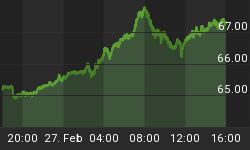It may come as a shock to many of you, but I too believe that we are experiencing a "Goldilocks" economy. However, unlike most on Wall Street I do not define this as economic growth that is neither too hot nor too cold. I believe the analogy is apt simply because U.S. economic growth is a fairy tale! When such gains are measured against the gains in the price of just about anything people buy, or in just about any foreign currency, it's a whole different story. For example; measured in euros, U.S. GDP has declined from 11.5 trillion in January of 2000 to 10 trillion today. From a European perspective, the U.S. economy has been in a seven-year recession, with GDP declining by close to 2% per annum.
Also ignored in the rhapsodizing over U.S. GDP growth is the extent to which consumption has been paid for with borrowed money. Since these debts must be repaid with interest, GDP will likely decline even more significantly in the future. Had we borrowed primarily to finance capital investment this would not be the case, as the loans could have been repaid out of increased income. However, as the vast majority of borrowing is simply used to purchase consumer goods, the income needed to repay the debts will have to come at the expense of reduced future consumption.
This week we received new data that illustrates how big of a financial hole U.S. consumers are digging. Despite disappointing sales from major retailers such as Target and Circuit City, first-quarter profits at MasterCard surged 70% to a record $214.9 million following a 19% jump in transactions. I see two possible explanations for this apparent paradox. The first is that despite buying fewer items, consumers were forced to borrow to pay for things that until recently they could afford to pay for in cash. A second possibility is that due to disappearing home equity and tighter lending standards, fewer home owners were able to tap into home equity and were thus forced to use credit cards instead. Since credit card debt carries higher interest rates and is non-tax deductible, it is far more expensive to finance then mortgage debt. Under either possibility, future consumption will suffer as an even greater share of personal income is devoted to making interest and principal payments on items consumed in the past.
Compounding the problem is the fact that job growth is stalling. April's 88,000 gain in non-farm payrolls is the most anemic in over two years. As falling real estate prices, rising mortgage payments, and tighter lending standards knock the legs out from under American consumers, look for even worse jobs reports in the months ahead. If Americans are struggling to make ends meet now, imagine how much harder it will be without paychecks!
While Americans continue to sacrifice their futures to indulge their present, the rest of the world sacrifices today to build a brighter tomorrow. As a result, the American economy will become increasingly less significant in global affairs. In January of 2000, the U.S. accounted for a staggering 31% of global GDP. While that percentage is still an impressive 28% today, it will likely fall to 20% over the next several years. This will certainly be true if Asian currencies, particularly the yuan, are allowed to rise to more realistic levels. Once the bottom really drops out of the dollar, I expect U.S. GDP to fall below 10% of global GDP. By then the world will surely have realized that the U.S. economy has not been the locomotive of global growth, but rather the caboose. If the actual productive economies decide to decouple the deadweight, the train would actually move much faster.
For a more in depth analysis of the true state of the American economy and how to prepare for its inevitable implosion read my new book "Crash Proof: How to Profit from the Coming Economic Collapse." Click here to order a copy today.
More importantly make sure to protect your wealth and preserve your purchasing power before it's too late. Protect your wealth and preserve your purchasing power before it's too late. Discover the best way to buy gold at www.goldyoucanfold.com, download my free research report on the powerful case for investing in foreign equities available at www.researchreportone.com, and subscribe to my free, on-line investment newsletter at http://www.europac.net/newsletter/newsletter.asp.















